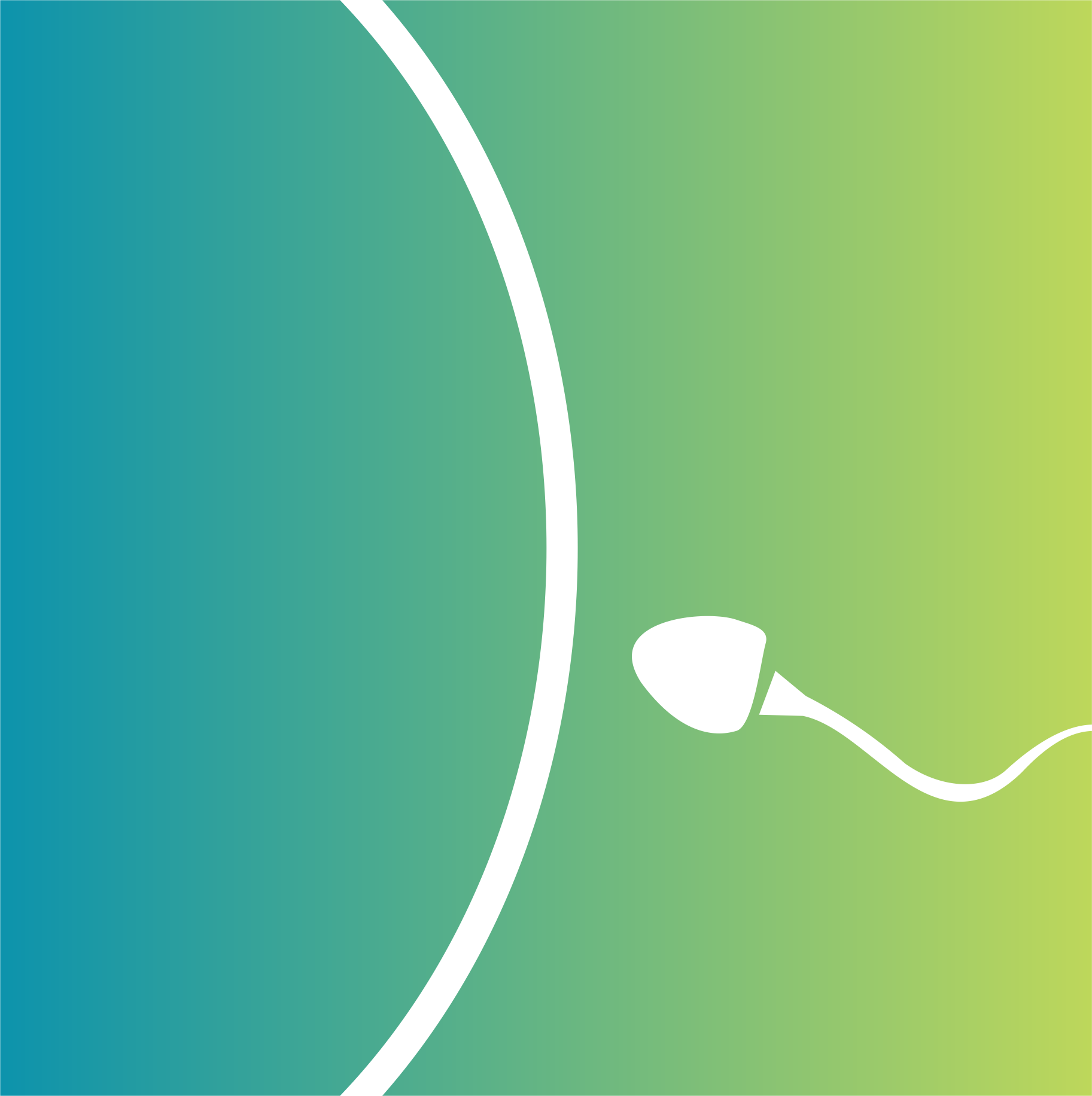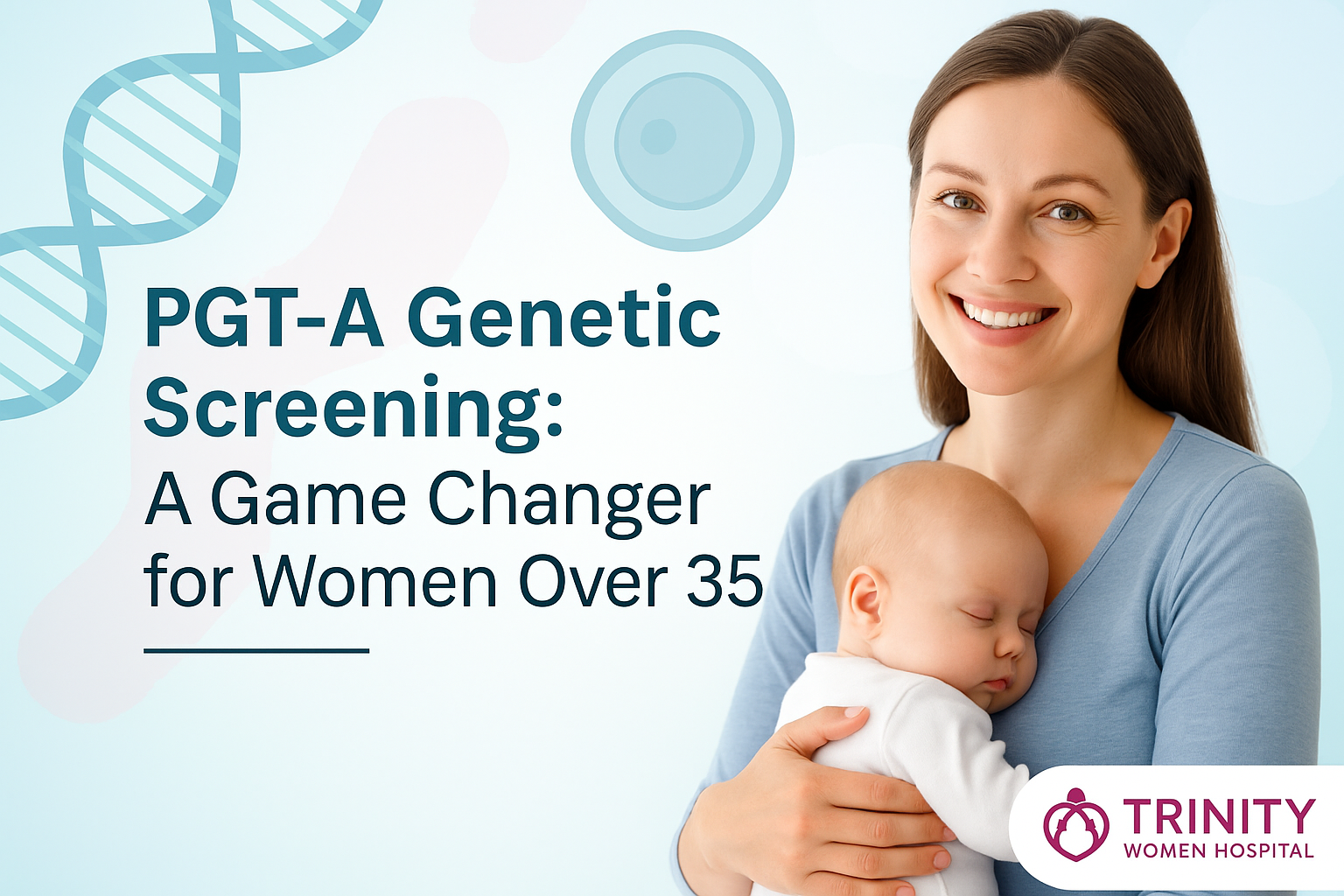For most women, the dream of motherhood never declines with age. But after 35, conceiving may feel harder. Challenges like problems in conception, increased miscarriage risks, and declining egg quality often arise. Fortunately, modern fertility therapies are rewriting the narrative. One of the most effective breakthroughs is PGT-A Genetic Screening.
At Trinity Women Hospital, we see how Preimplantation Genetic Testing for Aneuploidy (PGT-A) is helping women aged 35+ get pregnant sooner, enjoy healthy pregnancies, and prepare for breastfeeding with confidence. By choosing the healthiest embryos, this test offers couples peace of mind and improves IVF success with fewer attempts.

Understanding PGT-A Genetic Screening
PGT-A is a test done during IVF. After fertilization, embryos develop in the lab. On day 5 or 6, a few cells are gently taken from the outer layer of the embryo (the part that forms the placenta, not the baby). These cells are checked for chromosomal health.
- A normal embryo has 46 chromosomes (23 from each parent).
- Embryos with missing or extra chromosomes (aneuploidy) often fail to implant or cause miscarriage.
At Trinity Women Hospital, PGT-A allows doctors to select the healthiest embryos, raising the chances of success and reducing the emotional toll on couples.
Why Women Over 35 Face Greater Challenges
It is natural that fertility declines with age:
- Egg quality decreases – Older eggs are prone to genetic issues.
- Higher miscarriage risk – Chromosomal abnormalities are more common.
- Repeated IVF failure – Without genetic screening, multiple failed attempts may occur.
- Emotional stress – Delayed conception can affect overall health and even breastfeeding later.
That’s why our team recommends PGT-A for women over 35, as it removes much of the “trial and error” from the IVF journey.
Advantages of PGT-A for Women 35+
PGT-A is rightly called a game changer because it offers:
- Faster time to pregnancy – Fewer failed cycles mean quicker conception.
- Lower miscarriage rate – Only healthy embryos are transferred.
- Higher IVF success – Stronger embryos implant more effectively.
- Peace of mind – Couples feel reassured about their baby’s start.
- Better breastfeeding preparation – Healthy pregnancies make post-delivery recovery smoother.
- Cost and time savings – Reduced failed attempts save money and stress.
- Emotional confidence – Women approach conception with hope instead of fear.
PGT-A and the Breastfeeding Connection
You may ask: What does breastfeeding have to do with PGT-A?
Indirectly, the link is very strong:
- Healthy pregnancy = healthier baby.
- Fewer complications = faster maternal recovery.
- Healthy babies latch better, making feeding easier.
- Emotional peace = improved milk production, as stress reduces supply.
At Trinity Women Hospital, we support mothers not only in conception but also in their beautiful breastfeeding journey.
Real-Life Patient Story
One of our patients, aged 39, had four failed IVF attempts at other clinics. She had lost hope. Through PGT-A, we identified one healthy embryo. She conceived in the next cycle, had a smooth pregnancy, and delivered a baby girl. Today, she shares that breastfeeding is easier for her because her baby is strong and healthy.
Stories like this prove why PGT-A is a game changer for women over 35.
Why Choose Trinity Women Hospital for PGT-A?
- Fertility experts experienced in advanced IVF.
- World-class labs for precise genetic testing.
- High success rates for women aged 35+.
- Full support from conception to delivery and breastfeeding.
- Emotional care to reduce treatment-related stress.
At Trinity Women Hospital, we don’t just help women conceive—we guide them through every stage of motherhood.
FAQs – PGT-A, Women Over 35, and Breastfeeding
Q1. How does PGT-A help women over 35 conceive faster?
PGT-A screens embryos for chromosomal health, transferring only the healthiest ones. Since women above 35 face reduced egg quality and higher miscarriage risk, PGT-A lowers failed IVF cycles and improves implantation. At Trinity Women Hospital, this leads to quicker conception and better preparation for breastfeeding.
Q2. Is PGT-A safe for the baby and mother?
Yes, PGT-A is safe. Only a few cells from the outer embryo layer are tested, which later forms the placenta, not the baby. It does not affect embryo growth. At Trinity Women Hospital, we follow strict global standards, and babies conceived with PGT-A are healthy. Mothers breastfeed naturally without restrictions.
Q3. Why do women over 35 need PGT-A more than younger women?
Eggs in women over 35 are more prone to genetic errors, often causing miscarriage or IVF failure. PGT-A identifies embryos with normal chromosomes, improving success rates. At Trinity Women Hospital, we especially recommend it for older women to achieve healthy pregnancies and smoother breastfeeding.
Q4. Is PGT-A guaranteed to ensure pregnancy?
No test can guarantee pregnancy, but PGT-A greatly increases the chances. By avoiding embryos with genetic issues, IVF success improves. Most women above 35 who undergo PGT-A at Trinity Women Hospital conceive within fewer cycles and enjoy healthy breastfeeding experiences afterward.
Q5. How does PGT-A indirectly affect breastfeeding?
PGT-A ensures that pregnancy begins with a genetically healthy embryo. This reduces complications, supports smoother deliveries, and results in healthier babies. Healthy babies nurse better, and relaxed mothers produce more milk. At Trinity Women Hospital, mothers who used PGT-A often report more positive breastfeeding experiences.
Final Thoughts
Motherhood is never out of reach for women over 35—with the right medical support. PGT-A Genetic Screening is transforming fertility journeys by improving IVF success, reducing miscarriage risks, and ensuring healthier pregnancies.
At Trinity Women Hospital, we combine advanced fertility science with compassionate care. From PGT-A and IVF to delivery and breastfeeding support, we are with you every step of the way.
💡 Remember: A healthy start with PGT-A leads to a healthier pregnancy, smoother delivery, and a joyful breastfeeding experience for both mother and child.

